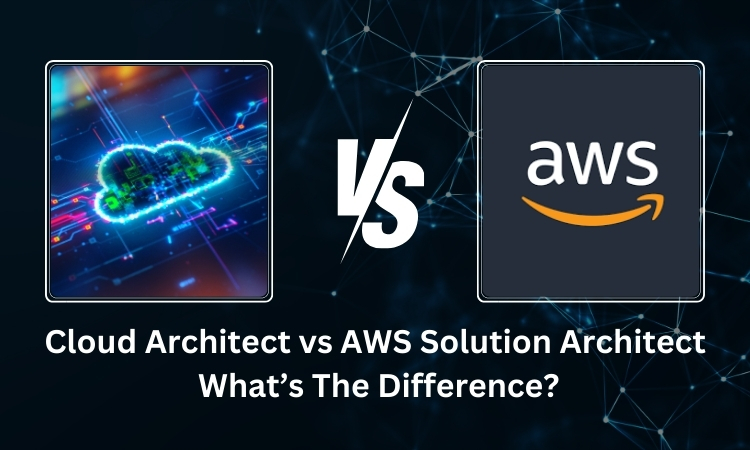In this blog, we will explore the key distinctions between these two roles, shedding light on their responsibilities, required skills, and how they contribute to an organization’s cloud infrastructure. Understanding these differences is crucial for professionals looking to pursue a career in cloud computing, as well as for businesses that want to make informed hiring decisions.
What is a Cloud Architect?
A Cloud Architect is a professional responsible for designing, building, and overseeing the architecture of cloud environments for an organization. This role involves creating cloud strategies, managing cloud infrastructure, and ensuring that all cloud-related components work together seamlessly to meet the organization’s business objectives.
Key Responsibilities of a Cloud Architect
- Designing Cloud Infrastructure: A Cloud Architect designs the overall architecture of cloud-based systems, ensuring that they are scalable, secure, and efficient. This includes selecting the right combination of cloud services, platforms, and tools.
- Cloud Strategy and Roadmap: Cloud Architects create cloud strategies tailored to the specific needs of the business. They work closely with leadership to ensure that cloud adoption aligns with long-term business goals.
- Multi-Cloud Management: Unlike an AWS Solution Architect who focuses on Amazon Web Services (AWS), a Cloud Architect often works across multiple cloud platforms, including AWS, Google Cloud Platform (GCP), Microsoft Azure, and even private clouds.
- Security and Compliance: Ensuring data security, governance, and compliance with industry standards is a major part of a Cloud Architect’s job. They must design systems that adhere to strict regulations, especially in industries like healthcare and finance.
Skills Required for a Cloud Architect
- Broad Cloud Knowledge: Cloud Architects must be proficient in multiple cloud platforms, including AWS, Azure, and Google Cloud, as they often work in environments that use more than one provider.
- Networking and Infrastructure: Knowledge of networking, virtualization, and infrastructure is crucial since a Cloud Architect is responsible for building secure and scalable environments.
- Security Expertise: Understanding cloud security principles and compliance requirements is essential for ensuring data protection and regulatory compliance.
- Leadership and Communication: Strong leadership and communication abilities are crucial for cloud architects, who frequently collaborate with senior leadership and other IT teams.
A Cloud Architect typically operates at a broader level, designing and overseeing the entire cloud environment for an organization, often working across different platforms.
What is an AWS Solution Architect?
An AWS Solution Architect specializes in designing and deploying applications specifically within the Amazon Web Services (AWS) ecosystem. This role is focused on understanding AWS services, crafting tailored solutions using AWS tools, and optimizing cloud performance within the AWS environment.
Key Responsibilities of an AWS Solution Architect
- AWS Solution Design: An AWS Solution Architect is responsible for designing cloud-based solutions that leverage the specific services offered by AWS, such as EC2, S3, RDS, and Lambda. They select the right AWS services to meet business needs while ensuring the architecture is scalable, cost-efficient, and secure.
- Integration with AWS Services: This role requires integrating various AWS services into a coherent architecture. AWS Solution Architects are experts in understanding how different AWS services interact and can optimize performance and cost.
- Migration to AWS: AWS Solution Architects often handle cloud migration, ensuring a smooth transition of applications and data from on-premises environments or other cloud platforms to AWS.
- Performance Optimization: AWS Solution Architects continuously monitor and optimize the performance of AWS solutions, ensuring they are reliable and can handle the organization’s workload efficiently.
Skills Required for an AWS Solution Architect
- AWS Expertise: It is crucial to have a thorough understanding of AWS services and how they interact. AWS Solution Architects must stay updated on AWS’s constantly evolving features and services.
- Serverless and Containerization: Experience with AWS-specific tools like Lambda (for serverless applications) and ECS or EKS (for containerized applications) is highly valuable.
- Cost Management: AWS Solution Architects need to understand how to optimize AWS services for cost-efficiency, making sure that businesses don’t overspend on unnecessary resources.
- Architectural Best Practices: AWS Solution Architects adhere to the company’s Well-Architected Framework, which emphasizes cost minimization, performance efficiency, security, and dependability.
Important Distinctions Between AWS Solution Architects and Cloud Architects
1. Scope of Work
- Cloud Architect: Works across multiple cloud platforms, including AWS, Azure, Google Cloud, and others. Their role is more strategic and broader, designing entire cloud infrastructures and strategies.
- AWS Solution Architect: Specializes in AWS services and designs solutions specifically for the AWS ecosystem. They are focused more on implementing and optimizing solutions within AWS rather than managing multiple cloud environments.
2. Focus on Cloud Providers
- Cloud Architect: Deals with various cloud service providers, requiring a broad understanding of multiple platforms.
- AWS Solution Architect: Requires extensive understanding of AWS services and tools and is exclusively focused on AWS.
3. Responsibility for Strategy vs. Implementation
- Cloud Architect: Often involved in creating cloud strategies and managing multi-cloud architectures at a strategic level.
- AWS Solution Architect: Focuses on putting certain ideas into practice and making sure they are cost-effective, scalable, and performance-optimized for AWS.
4. Cloud Adoption Approach
- Cloud Architect: May work with hybrid or multi-cloud environments, tailoring the right mix of public and private cloud services.
- AWS Solution Architect: Focuses exclusively on AWS, offering solutions and optimizations within that ecosystem.

